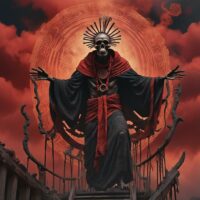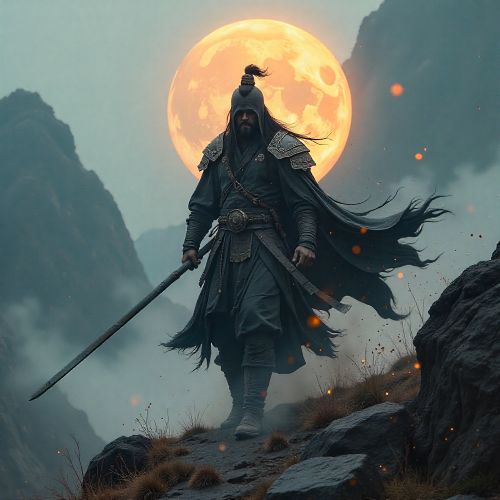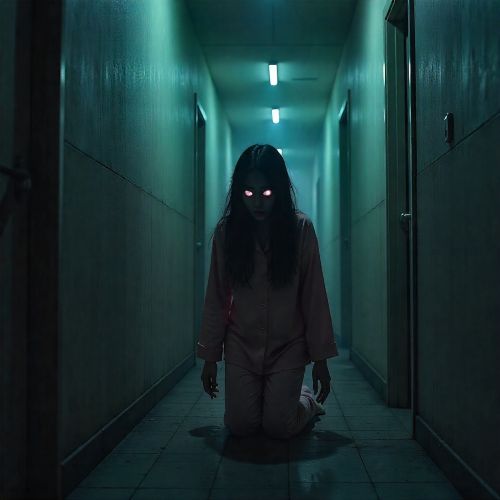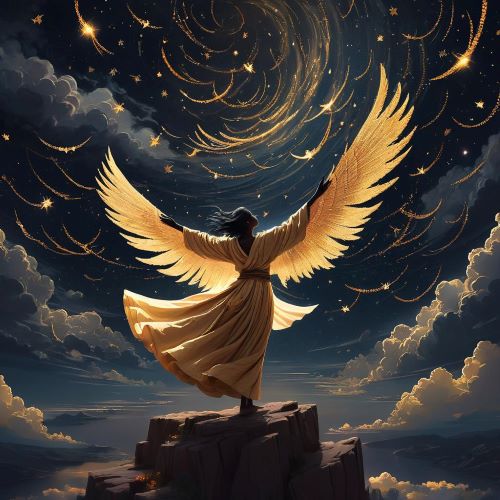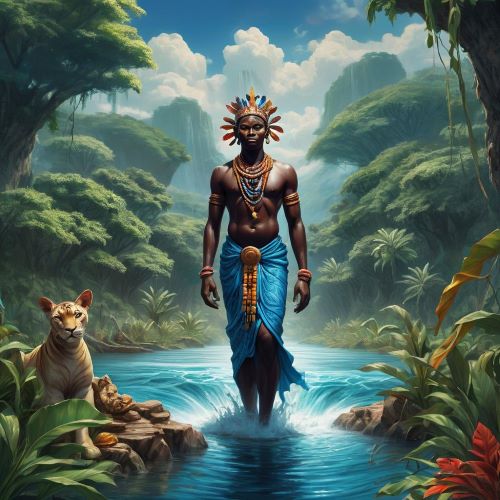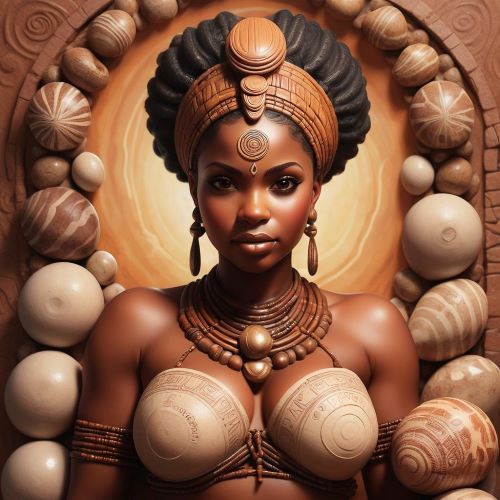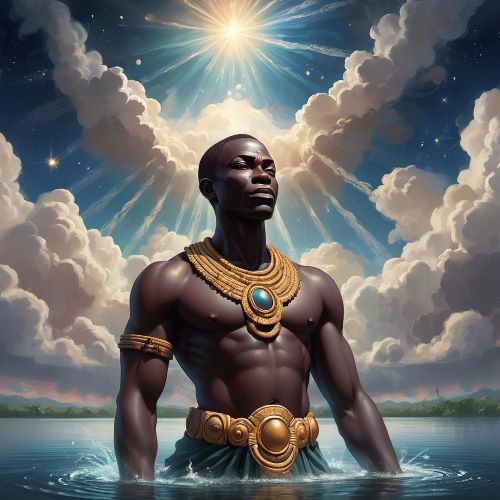Owuo : God of Death
Listen
At a glance
| Description | |
|---|---|
| Origin | Akan Mythology |
| Classification | Gods |
| Family Members | N/A |
| Region | Ghana and Côte d’Ivoire |
| Associated With | Death, Transformation |
Owou
Introduction
In the spiritual world of Akan mythology, Owou is the embodiment of death—a force not of cruelty but of cosmic balance. Unlike depictions in many Western traditions where death is synonymous with dread or finality, Owou is seen as an inevitable guide, ushering souls from the realm of the living to the domain of ancestors. He is both feared and respected, serving as a constant reminder of life’s impermanence. As the Akan people of Ghana and Côte d’Ivoire understand it, Owou is not just the end, but part of a larger cycle of life, death, and spiritual continuity.
Physical Traits
Owou’s image is one that lingers in the mind: unsettling, symbolic, and deeply spiritual. Oral traditions often describe him as a lean, bald, and dark-skinned man with one glowing eye—a glowing left eye from which death emerges, and a dark right eye that conveys his shadowy dominion. Every time he blinks or winks, a life is claimed, symbolizing the ceaseless presence of mortality. Sometimes, he is imagined towering over mortals, cloaked in an aura of darkness, accompanied by signs like whirlwinds, vultures, or the mournful tones of the color red. These features aren’t just about fear—they embody transformation and the passage from the visible to the invisible world.
Family
Owou doesn’t have a clearly defined family in the human sense, but his relationships with other deities are central to his mythological significance. He is believed to be the creation of Odomankoma, the creative aspect of the Supreme Being, who brought forth all things. In a profound myth, Owou slays Odomankoma, suggesting that even the creator is subject to death. Yet, Odomankoma revives through Nyame (also known as Onyankopon), showing that death, creation, and resurrection are inseparably linked.
Owou also maintains a complex rivalry with Tano, the river deity. In a tale of cosmic competition, both beings race to be the first to reach a hunter’s home—an allegorical battle for influence over humankind. Tano’s victory leads to a compromise: Owou may claim lives, but only if he arrives before Tano. This myth encapsulates the idea that while death is inevitable, it operates within spiritual laws and boundaries.
Other names
The name Owou literally translates to “death” in the Akan language, and it powerfully defines his role. However, various names and titles further reflect his attributes and influence:
-
Odomankoma Owou (“Death of Creation”) alludes to his power over even the creator.
-
Owou Papa (“Death Fan”) evokes his role in blowing spirits into the ancestral world.
-
Owou Kwaaku, or “Death born on Wednesday,” follows Akan naming customs and speaks to his distinct spiritual personality.
Beyond the African continent, Owou’s persona echoes in the Caribbean, particularly in Jamaican folklore. There, he sometimes appears as Bredda Death, a grim figure entwined with Ananse the spider-trickster, showing how African deities morphed across the Atlantic into new cultural expressions.
Powers and Abilities
Owou’s presence is inescapable, his powers rooted in the essence of existence. Most notably, he governs the end of life—not with malice, but with the authority of balance. His signature act—causing death with a blink—speaks volumes about his omnipresence and quiet dominance. He is not a destroyer for pleasure; he is the agent who ensures the world does not overflow with unchecked life.
His powers extend to the spiritual world, where he commands both protective and destructive forces. Witches (Obayifo), ghosts, and ancestral spirits move at his direction, highlighting his influence beyond the visible. Despite this, he is incorruptible. As the Akan saying goes, “Owou mpɛ sika”—”Death doesn’t like money”—meaning no bribe, offering, or trick can delay his hand. He is feared, yes, but also honored as a force that keeps the balance of nature and divinity intact.
The Adinkra symbol “Owou Atwedee”, or “Death’s Ladder,” often associated with him, represents the journey from birth to death. It’s a powerful visual reminder that life is not a static condition but a path with a destined conclusion.
Modern Day Influence
Despite originating in ancient spiritual systems, Owou’s legacy continues to influence modern culture, especially in regions where Akan heritage remains strong. His symbols and stories are embedded in funeral rites, where drumming, dancing, and ancestral invocation are believed to ease the soul’s transition. These rituals often symbolically invite Owou to carry the departed safely to the spiritual realm.
His presence is equally strong in Akan proverbs and Ananse stories, which remain a vibrant part of Ghanaian storytelling and oral education. Through these tales, children and adults alike are taught to respect death—not to fear it blindly but to understand its place in the cycle of existence.
In visual art, Owou is evoked through textile patterns, woodcarvings, and funerary architecture. The ladder motif—evoking Owou Atwedee—is a frequent symbol in Adinkra cloth designs worn during funerals, representing the community’s acceptance of life’s spiritual journey.
In the African diaspora, especially in the Caribbean, Owou has taken on new forms while retaining his core traits. His stories merge with local folklore, creating characters who echo his mission and temperament. These reinterpretations, found in oral traditions and even modern literature, show that Owou’s role as the arbiter of life’s final passage still resonates across cultures and generations.
Related Images
Source
Mystery in History. (2025, March 26). Owuo In Akan Beliefs: Symbolism Of Death And Mortality. https://mysteryinhistory.com/owuo/
Mystery in History. (n.d.). Owuo In Akan Beliefs: Symbolism Of Death And Mortality. Facebook. https://m.facebook.com/mysteryinhistory82/posts/owuo-in-akan-beliefs-symbolism-of-death-and-mortality/122226448448235088/
Oxford Reference. (n.d.). Owuo: When His Eye Shuts, A Man Dies. https://www.oxfordreference.com/display/10.1093/oi/authority.20110803100258908
Riordan Wiki. (n.d.). Owuo. Fandom. https://riordan.fandom.com/wiki/Owuo
TV Tropes. (n.d.). Myth / Akan Mythology. https://tvtropes.org/pmwiki/pmwiki.php/Myth/AkanMythology
Wikipedia. (n.d.). Owuo. https://en.wikipedia.org/wiki/Owuo


